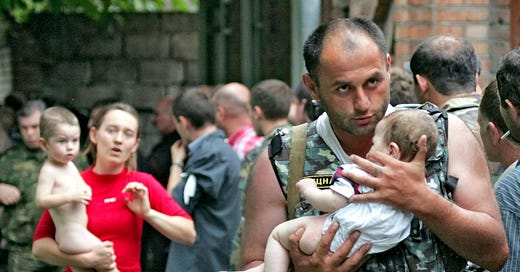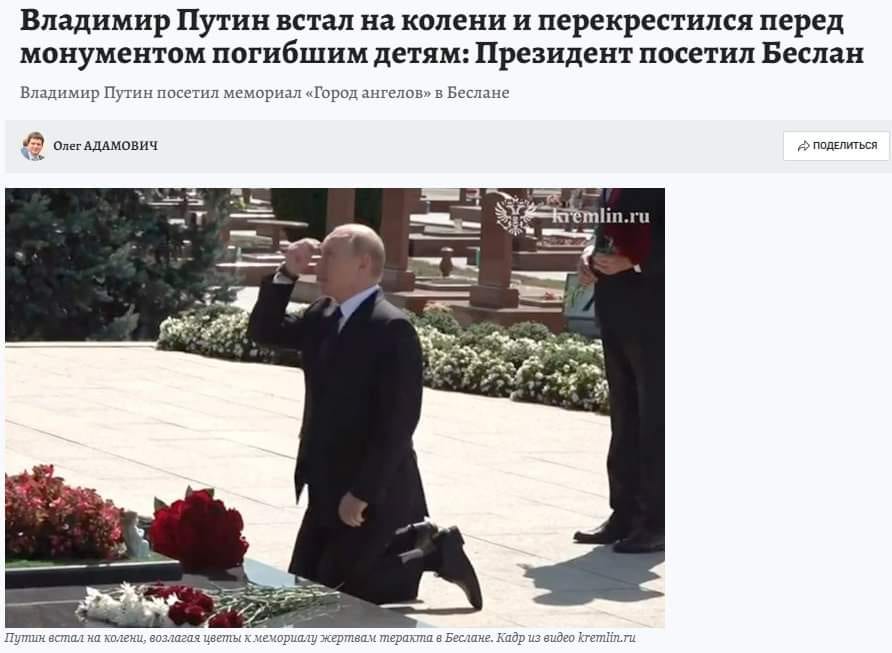Terror in Beslan (Part 1 of 2)
The Beslan school siege began 20 years ago today. The events of that day are still seared into my memory. More significantly it was a turning point in Vladimir Putin's rule.
The Beslan school siege may have have happened two decades ago but it still resonates deeply. The three-day hostage crisis in southern Russia that ended in the death of 334, more than 180 of them children, was one of the formative events that made Vladimir Putin the leader that he is today.
By 2004 Putin was already beginning to distrust the West. But after Beslan, for the first time, he explicitly accused western governments of trying to undermine Russia. Where others saw a last desperate attempt by ruthless Islamist militants to force Moscow’s troops out of Chechnya, Putin saw the nefarious hand of western secret services.
He was especially aggrieved that while Washington and London were fighting in Iraq and Afghanistan – and racking up their own dirty secrets – they were criticising Russians for (far worse) human rights abuses in Chechnya.
Putin later gave a speech in which he said: “We showed ourselves to be weak. And the weak get beaten.” Soon afterwards he banned elections for regional governors in Russia and began to appoint them himself.
It was lunchtime and I was standing in a side street not far from the school when the first two explosions came.
Then a middle-aged woman began to cry, deep choking sobs that seemed to come from her chest. There was a long burst of gunfire and, as it died, what sounded like the distant screams of children.
A group of parents and relatives dressed in tracksuits, who only minutes before had been standing beside a small yellow BMW talking, started to curse wildly. One tore at his hair.
Then the first child was pulled over a white brick wall. He had on only his underwear and his face was bloodied. A hail of gunfire erupted nearby. Then another child, a girl, was hauled over.
Her mother, a middle-aged woman dressed in a black skirt, was standing nearby. She ran and grabbed the girl, they hugged and held each other tight. "She's alive. She's alive," the mother shouted, face streaming with tears.
The next boy to escape was small and very skinny. He only had on green underwear and had a bandaged leg. He looked around in hope, but there was nobody waiting for him.
The relatives were desperate to get more children out. A small group tried to tear down a heavy sheet of metal to make their escape easier. Armed civilians were shouting for ambulances, but there were none.
In the creases of the walls and behind corners soldiers crouched, their Kalashnikov assault rifles pointing down the street towards the shooting.
Then another girl came over the wall, her face was covered in mud and she had on a long red shirt and terror in her eyes. Then a boy came covered in blood. Then another, barefoot and also bloodied. Then a third only wearing a sock, screaming. Then several more.
Many of the children were bandaged, some on the head, others on the arms or the legs. When they saw them the adults, who had spent two days and nights waiting outside the school, started to cry hysterically.
Some became angry. One saw me, clearly a foreigner, and punched me. The air hung thick with smoke and the smell of cordite.
At the end of the street Spetsnaz, the Russian special forces, carefully edged their way around the corner of a brick building. Despite their heavy green gear they moved like cats, one step at a time, the man in front beckoning to the one following.
A young girl was brought over the fence, she must have been about 13. She had on a soiled bra. Then two more girls, both covered in blood and half naked.
"Did they kill the children, did they kill the children?" one of the waiting mothers screamed.
A large man in a track suit, who was smoking long, feminine cigarettes swore. "Fuckers, Fuckers." There are more explosions and more gunfire.
The next boy to emerge was naked and unconscious or dead. He was carried away on a stretcher by two men, one stripped to the waist and wearing a black leather cap.
The soldiers looked on nervously, guns cocked and held tight to the shoulder. Nobody knew if or where the terrorists would break out. Two old women, oblivious to the danger, tried to walk towards the shooting. They were waved back by a man with a gun who shouted at them repeatedly.
Then a small, slight boy emerged. All he had on was his underpants and in his hands he was clutching some half-eaten biscuits.
For a moment he looked lost. Then a huge man lifted him up and hauled him across the road to safety. As he lowered him to the ground, he turned politely to the man and said: "Thank you very much, Sir."
In the case of Beslan ‘like’ is the wrong word, but please ‘like’ this post if you found it interesting or illuminating and offer comments and thoughts, positive or negative. A special thanks to paid subscribers who make this blog possible.
AUDIO
The chaos at the school that day meant that it was difficult to use a notepad. So I surreptitiously recorded what I could on a small tape recorder that I had clipped to a strap on my bag. Here is some of the original audio. I still find it hard to listen to.
(Next week: Part 2: The end of the siege and, for me, the end of a 15-year spell as a frontline journalist.)








Thank you again for a well written knowledgeable article.
I have read the obituary recently of one of the SAS involved in the Iranian embassy siege.
Did the Russian special forces attempt to negotiate with the militants to resolve the situation or space within which to find a way of storming the building to save lives?